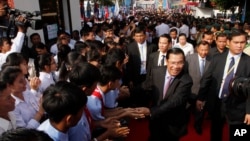The ruling Cambodian People’s Party held its annual congress in Phnom Penh over the weekend, releasing plans for a grassroots effort to bolster its support for local elections in 2017.
A leaked document from the two-day, closed-door meeting derides the opposition Cambodia National Rescue Party for its use of contentious border issues to make political gains and warns CPP members to remain wary of the opposition leading into 2017.
Rescue Party lawmakers and political observers said Monday that the CPP should be establishing a strategic plan to lead the country, rather than focusing on winning an upcoming election.
In a 49-page strategy paper distributed at the meeting, the CPP leadership said the party will focus on establishing local networks across the country to bolster their support and prepare for elections. The party expects “some political factors,” the paper says, but also “many hurdles, particularly with slow reform to become stronger and more effective, to strengthen our vision, our stance and our actions, as well as build up our confidence and be highly cautious and to curb malicious acts of the opposition.”
The CPP will seek to enact its policy through election reform, local officials and grassroots efforts at the village and district level, while getting out the vote, the paper says.
Rescue Party spokesman Yim Sovann said the paper was a reminder that political parties should avoid besmirching each other, but should instead focus on implementing their policies for the benefit of Cambodians, who must choose whom they support. The Rescue Party has broken no laws and works in “a peaceful manner,” he said. “We don’t regard any Khmer as an enemy.”
The strategic plan of the Rescue Party is to enact policies that help people by listening to their needs, he said. “This is nothing difficult.”
Cambodia is preparing for local commune elections in 2017 and national elections the following year.
Koul Panha, head of the election monitoring group Comfrel, said strategic plans are important for parties to compete with each other. But he also said that many of the officials who oversee elections and their preparations are loyal to the CPP, which makes for “complications.”
“What does that mean? It means that the people who have the duty to maintain security and safety for other parties will protect their own party, the ruling party,” he said.
In its strategic paper, the CPP says it will enforce the law and maintain stability and peace, while seeking to improve public services, encourage peace and economic growth, boost salaries of public officials and garment workers and seek to ratify a law to regulate unions in 2016.
Ou Virak, head of the think tank Future Forum, said the strategy paper held no surprises. However, he said, rather than a call to reform, the paper seemed to indicate at least some concern by the CPP over the success of the opposition in 2013.
“It means the CPP is afraid, which is unlike previous terms, when they didn’t care much,” Ou Virak said. “What we want to see are systemic reforms, the removal of officials, especially at the Council of Ministers, and the setting of clear policy.”
Still, he said, many of Cambodia’s woes remain, even as a new election approaches. “Now we can see the failure of the judicial system, the failure on land issues and management of economic land concessions, and the failure to curb deforestation,” he said. “These are headache issues.”




